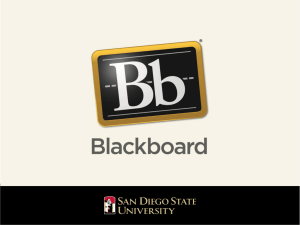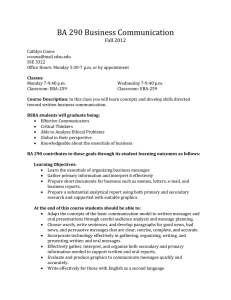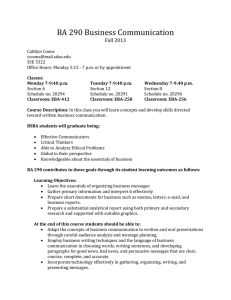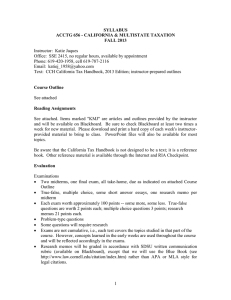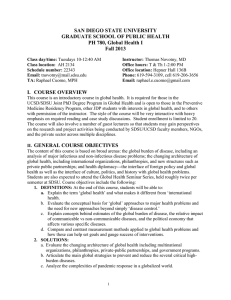SAN DIEGO STATE UNIVERSITY GRADUATE SCHOOL OF PUBLIC HEALTH Spring 2012
advertisement
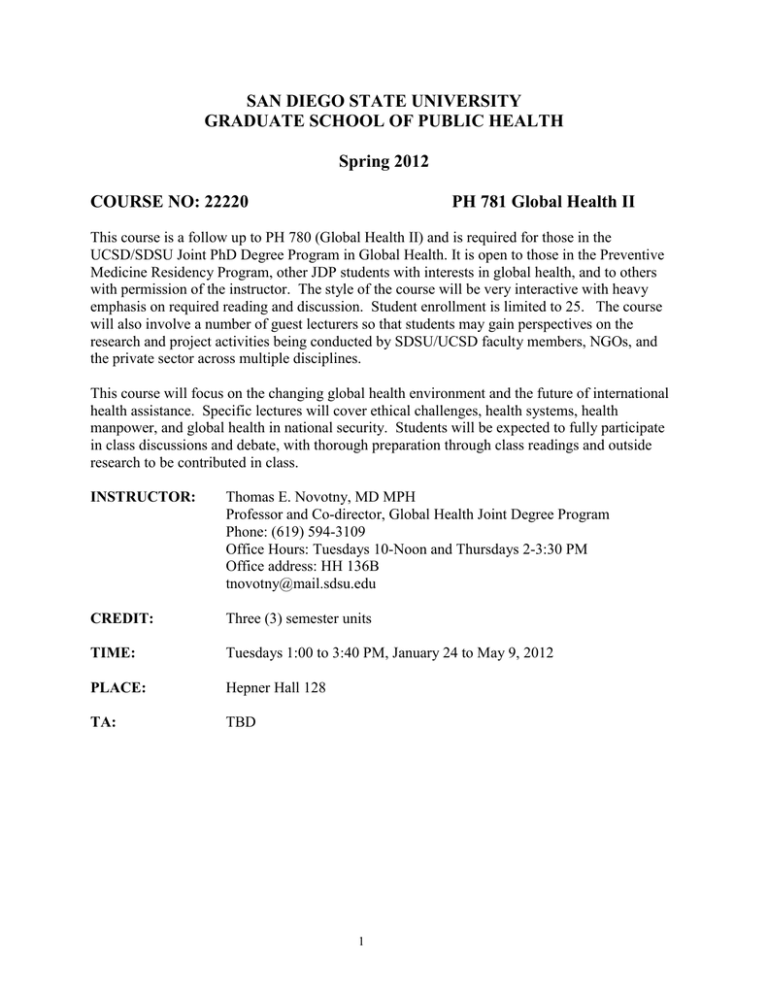
SAN DIEGO STATE UNIVERSITY GRADUATE SCHOOL OF PUBLIC HEALTH Spring 2012 COURSE NO: 22220 PH 781 Global Health II This course is a follow up to PH 780 (Global Health II) and is required for those in the UCSD/SDSU Joint PhD Degree Program in Global Health. It is open to those in the Preventive Medicine Residency Program, other JDP students with interests in global health, and to others with permission of the instructor. The style of the course will be very interactive with heavy emphasis on required reading and discussion. Student enrollment is limited to 25. The course will also involve a number of guest lecturers so that students may gain perspectives on the research and project activities being conducted by SDSU/UCSD faculty members, NGOs, and the private sector across multiple disciplines. This course will focus on the changing global health environment and the future of international health assistance. Specific lectures will cover ethical challenges, health systems, health manpower, and global health in national security. Students will be expected to fully participate in class discussions and debate, with thorough preparation through class readings and outside research to be contributed in class. INSTRUCTOR: Thomas E. Novotny, MD MPH Professor and Co-director, Global Health Joint Degree Program Phone: (619) 594-3109 Office Hours: Tuesdays 10-Noon and Thursdays 2-3:30 PM Office address: HH 136B tnovotny@mail.sdsu.edu CREDIT: Three (3) semester units TIME: Tuesdays 1:00 to 3:40 PM, January 24 to May 9, 2012 PLACE: Hepner Hall 128 TA: TBD 1 COURSE DETAILS REQUIRED TEXT: Merson MH, Black RE, Mills AJ. International Public Health: Diseases, Programs, Systems and Policies (3rd ed.). Sudbury, MA: Jones and Bartlett Publishers, 2011. WEBSITE: All assignments, course documents, news, and changes will be posted to the PH 781 Blackboard site. Registered students will have immediate access to this site. ASSIGNMENTS Read all assigned materials Develop group presentation as scheduled for your group Develop a two-page (limit) outline for your term paper; this should be placed on Blackboard by 5 PM, March 6, 2012. Comments will be provided and returned by email to students within 2 weeks. Check Blackboard for further guidelines on this outline paper. It will constitute your mid-term exam and be worth 10 points. Prepare a double-spaced, 10 page term paper (margins 1 inch, 11pt Arial Font) not including references, charts, or graphs on an issue discussed in the course. Guidelines for the paper are posted on Blackboard. Term Papers should be placed on Blackboard by midnight, May 1, 2012. Prepare a team presentation on a group assignment to be provided in class; deliver a 50 minute presentation by the team (4 students in each team), using Power Point, describing findings and recommendations. Topics will include the following, but others can be suggested according to student interests and number of enrollees. The important point here is to engage in group learning and to communicate new information to the rest of the class. a. Health Systems: Comparisons and Commonalities Among Health Systems-developed countries and LMICs b. Financing health systems: what are the options, lessons learned from various settings, and challenges for LMICs in the 21st Century. c. Development Assistance for Health: What next for the US, UN, World Bank, and everyone else? Final examination (take home, open book) will be distributed by email on Thursday, May 10, 4PM. Place completed exam io Blackboard by Monday May 14, 8AM. This will consist primarily of brief essay-type questions, covering material presented in class and in readings. GRADING: Grading will be based on the following: Required attendance and participation 10 points (1 point extra credit for attending each Global Health Symposium, three planned this semester) Term paper outline by March 6 10 points Group project presentations 20 points Final exam 20 points Term paper* 30 points Letter grades will be based on cumulative scores: 100-95= A 79-75= C+ 94-90= A74-70= C 2 89-85= B+ 69-60= D 84-80= B <60 = F [non-passing grade] *Papers received after due date score will be decreased by 10 points Attendance: Attendance will be taken during each class period on a sign-in sheet. One excused absence is allowed, after which the attendance and participation grade will be reduced. A make up paper may be assigned, involving a 2-page policy brief on the subject matter of the missed lecture. Disclaimer: Course Syllabus Subject to Change Every effort will be made to follow the syllabus content and schedule; however, if circumstances dictate, there may be modifications necessary during the semester. The professor or Graduate Assistant will notify students in a timely manner. Academic Integrity: Academic dishonesty is an affront to the integrity of scholarship at SDSU and a threat to the quality of learning. Violations of academic integrity are noted in the SDSU Statement of Student Rights and Responsibilities: http://csrr.sdsu.edu/rights2.html/. Plagiarism: Plagiarism is easier than you think. With web resources and open access online publications, it is common to ‘cut and paste’ already published, copyrighted work. This is academically and ethically unacceptable, and all students are encouraged to take the online tutorial offered by the SDSU library (http://infotutor.sdsu.edu/plagiarism/) . The TURNITIN tool on Blackboard allows you to check your work for potential problems. Overall Course Learning Objectives 1. Be able to explain the concept of ‘health systems’ and how these systems must respond to today’s global health challenges. 2. Develop critical analyses of global health financing and economics in the 21st Century. 3. Evaluate the role of health in US national security. 4. Understand the history, complexity, and challenges of ethical global health research and practice. 5. Evaluate the global health workforce crisis 6. Critique the US Global Health Initiative 7. Understand the ethical challenges in global health work CLASS SCHEDULE Date January 24 Topics Introductions, course overview. T. Novotny Discussion: The term paper requirement and group assignments Readings (Required Reading in BOLD) 1. Szlezak NA, Bloom BR, Jamison DT, Keusch GT, Michaud CM, et al. (2010) The Global Health System: Actors, Norms, and Expectations in Transition. PLoS Med 7(1): e1000183. doi:10.1371/journal.pmed.1000183 2. Frenk J, 2010 The Global Health System: Strengthening National Health Systems as the Next Step for Global Progress. PLoS Med 7(1): e1000089. doi:10.1371/journal.pmed.1000089 3. Keusch GT, Kilama WL, Moon S, Szlezák NA, Michaud CM. The global health system: linking knowledge with action-- 3 4. January 31 Health Systems Lecture I: Overview of Health Systems 1. Dr. C. Stoskopf, Director, GSPH 3. Discussion Questions: (See Blackboard) February 7 Health Systems Lecture II: Global Health Financing T. Novotny Discussions Questions: (See Blackboard) February 9 February 14 Global Health Symposium: Sir Richard Feachem, UCSF Global Health Sciences Health Systems Lecture III: Global Health Workforce Crisis T. Novotny Discussion Questions: (See Blackboard) February 21 Student Presentations I: Health Systems: Comparisons and Commonalities Among Health Systems: 2. learning from malaria. PLoS Med 2010 Jan 19;7(1):e1000179 Moon S, Szlezák NA, Michaud CM, Jamison DT, Keusch GT, et al. 2010 The Global Health System: Lessons for a Stronger Institutional Framework. PLoS Med 7(1): e1000193. doi:10.1371/journal.pmed.1000193 Chapter 11, Merson. The Design of Health Systems, AJ Mills and K Ranson Chapter 1, Johnson (Introduction to Health Systems, Stoskopf and Johnson) (SEE COURSE DOCUMENTS) Swanson RC, Bongiovanni A, Bradley E, Murugan V, Sundewall J, et al. (2010) Toward a Consensus on Guiding Principles for Health Systems Strengthening. PLoS Med 7(12): e1000385. doi:10.1371/journal.pmed.1000385 1. World Health Report 2010: HEALTH SYSTEMS FINANCING: http://www.who.int/bulletin/health_financing.pdf. 2. Bennett S, Ozawa S, Rao KD (2010) Which Path to Universal Health Coverage? Perspectives on the World Health Report 2010. PLoS Med 7(11): e1001001. doi:10.1371/journal.pmed.1001001 3. Resource: http://www.who.int/whr/2010/media_centre/en/ “Reengineering Aid: A bold agenda for the 21s Century” SSE 1401 4:00PM to 6:00PM 1. The looming crisis of the health workforce: How can OECD countries respond? (OECD, 2008) 2. Ranson MK, Chopra M, Atkins S, Dal Pozc MR, Bennett S. Priorities for research into human resources for health in lowand middle-income countries. Bull World Health Organ 2010;88:435–443 | doi:10.2471/BLT.09.066290Introduction 3. Yudkin J, Owens G, Martineau F, et al. Global health-worker crisis: the UK could learn from Cuba. The Lancet 2008; 371(9622)1397-1399. 4. Resource: http://www.who.int/workforcealliance/en/ 5. Resource: WHO Bulletin Special Issue on Health Workforce: http://www.who.int/bulletin/volumes/88/5/en/index.html. 1. Remme JHF, Adam T, Becerra-Posada F, D'Arcangues C, Devlin M, et al. (2010) Defining Research to Improve Health Systems. PLoS Med 7(11): e1001000. doi:10.1371/journal.pmed.1001000 2. 4 February 28 developed countries and LMICs Global Health and National Security I: View from the NSC Guest Lecturer: Kenneth Bernard, MD, DTM&H, Former US National Security Council Advisor on Global Health March 6 The US Global Health Strategy T. Novotny March 13 Global Health Economics I. Development Assistance for Health II. HIV and Health Shocks March 20 Guest Lecturers: Professor Joshua Graff Zivin, Research Director, Institute on Global Conflict and Cooperation, and Dr. Gordon McCord, Development Economist, UCSD Discussion Questions: (See Blackboard) Special Guest Lecturer: Distinguished Professor John Weeks, SDSU Dept of Geography: "Connecting the Dots Between Health, Poverty, and Place in Accra, Ghana." 1. Rodier G, Greenspan AL, Hughes JM, Heymann DL. Global public health security. Emerg Infect Dis [serial on the Internet]. 2007 Oct. Available from http://www.cdc.gov/EID/content/13/10/1447.htm 2. Bernard KW. Bridging the ideological gap: Health as a Security Issue in the 21st Century. 6/16/08 3. Bernard KW, Danzig RJ. A Deadly Virus We May Still Need. New York Times, January 5, 2011. Retrieved from, http://www.nytimes.com/2011/01/06/opinion/06ihtedbernard06.html, January 8, 2011 1. Watch: http://globalhealth.kff.org/Multimedia/2012/January/05/gh010 512video.aspx 2. Review: For the period 2011 through 2015. The Global Health Strategy (GHS): Available online PDF [60p.] at: http://1.usa.gov/x5V8aO 1. Ravishankar N, Gubbins P, Cooley RJ, Leach-Kemon K, Michaud CM, Jamison DT, Murray CJL. Financing of global health: tracking development assistance for health from 1990 to 2007. Lancet 2009;373(9681): 2113-2124. DOI: 10.1016/S0140-6736(09)60881-3. 2. Zivin JG. The Global HIV/AIDS Epidemic. National Bureau of Economic Research, Economic Report of the President Chapter 7. 3. Thirumurthy H, J Graff Zivin and M Goldstein, “The Household Impacts of Treating HIV/AIDS in Developing Countries” in, Annual World Bank Conference on Development Economics 2008: People, Politics, and Globalization 1. Connecting the Dots between Health, Poverty and Place in Accra, Ghana, Forthcoming in The Annals of the Association of American Geographers, Special Issue on “The Geography of Health” (2012) 2. Merson. Chapter 3, The Social Determinants of Health. Michael P. Kelly and Emma Doohan 5 April 3 April 10 April 17 VENUE: Geography Department Seminar Room (SH 321) Spring Break Student Presentations II: Financing health systems: what are the options, lessons learned from various settings, and challenges for LMICs in the 21st Century. Global Health and Security II: North Korea and TB, Biological Weapons Guest Lecturer: Louise S. Gresham, PhD, MPH, Senior Director, Global Health and Security Initiative, Nuclear Threat Initiative Ethical challenges in global health T. Novotny April 24 Gresham LS, Pray, L. “Regional Infectious Disease Surveillance Networks.” Improving Implementation of the Biological Weapons Convention: The 2007-2010 Intersessional Process Ed. Piers Millett. UN Publications unidir/2011/7, New York and Geneva, 2011. 239-245. 1. Hearst N, Novotny TE. Community and International Studies. In, Hulley SB, Cummings SR, Browner WS, et al. Designing Clinical Research, 3rd Edition. Philadelpia, PA: Lippincott, Williams, & Wilkins, 2007. 2. 18th World Medical Association General Assembly. World Medical Association Declaration of Helsinki: Ethical Principles for Medical Research Involving Human Subjects. June 1964. Last Amended October 2008. Retrieved January 24, 2009. http://www.wma.net/e/policy/b3.htm4 3. Cohen JE, Amon JJ. Health and human rights concerns of drug users in detention in Guangxi Province, China. PLoS Med. 2008 Dec 9;5(12):e234. 4. Selgelid MJ. Ethics, Tuberculosis and Globalization Public Health Ethics (2008) 1(1): 10-20. 5. Page-Shafer k, Saphonn V, Sun LP, et al. HIV prevention research in a resource-limited setting: the experience of planning a trial in Cambodia. Lancet 2005;366(9465(:14991503). Student Presentations III: Development Assistance for Health: What next for the US, 6 UN, World Bank, and everyone else? May 1 Student Choice! Term Papers Due at midnight May 8 Course wrap-up and evaluation May 14 Final Exam Due 8 AM 7 Statement on Nondiscrimination Policy San Diego State University complies with the requirements of Title VI and Title VII of the Civil Rights Act of 1964, as well as other applicable federal and state laws prohibiting discrimination. No person shall, on the basis of race, color, or national origin be excluded from participation in, be denied the benefits of, or be otherwise subjected to discrimination in any program of the California State University SDSU does not discriminate on the basis of disability in admission or access to, or treatment or employment in, its programs and activities. Students should direct inquiries concerning San Diego State University’s compliance with all relevant disability laws to the Director of Student Disability Services (SDS), Calpulli Center, Room 3101, San Diego State University, San Diego, CA 92128 or call 619-594-6473 (TDD: 619-594-2929). SDSU does not discriminate on the basis of sex, gender, or sexual orientation in the educational programs or activities it conducts. More detail on SDSU’s Nondiscrimination Policy can be found in the SDSU General Catalog, University Policies. Student Conduct and Grievances SDSU is committed to maintaining a safe and healthy living and learning environment for students, faculty and staff. Sections 41301, Standards for Student Conduct, and Sections 4130241304 of the University Policies regarding student conduct should be reviewed. If a student believes that a professor’s treatment is grossly unfair or that a professor’s behavior is clearly unprofessional, the student may bring the complaint to the proper university authorities and official reviewing bodies. See University policies on Student Grievances. Statement on Plagiarism and Academic Dishonesty Academic dishonesty includes cheating, plagiarism or other forms of academic dishonesty that are intended to gain unfair academic advantage. See section 41301 of the University policies. Plagiarism is an important element of this policy. Plagiarism is defined as ‘formal work publicly misrepresented as original; it is any activity wherein one person knowingly, directly and for lucre, status, recognition, or any public gain resorts to the published or unpublished work of another in order to represent it as one’s own’. Any work, in whole or in part, taken from the Internet or other computer-based source without referencing the source is considered plagiarism. 8
